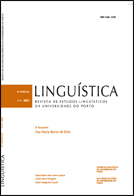The construction of women's identity in a court decision on domestic violence
Abstract
In this paper we propose to demonstrate the analytical and critical potential of Discourse Studies for understanding identity constructs in a judicial decision on domestic violence. Taking as reference the concept of ideology in the sociocognitive framework (Van Dijk, 1995), that allows linking ideology and discourse, and using enunciative-pragmatic analytical categories, we will analyse certain aspects of a judicial decision, which demonstrate how the discourse structures favour a stigmatising and blaming representation of the woman victim of domestic violence and the consequent excuse and legitimisation of violence against her. The object of analysis will be a decision of the Court of Appeal of Porto, Portugal, issued on October 11, 2017, concerning a domestic violence lawsuit, in which the adultery of the assaulted woman is an argument for excusing the violence exerted by the aggressors. To implement our study, we will detach and analyse the linguistic means used to represent the actors involved; the predications attributed to them and the verbal processes in which they participate (Reisigl & Wodak, 2009). We will also detach and analyse instances of doxa invocation and evidentiality, occurrences of strong evaluative modality and mechanisms of illocutionary reinforcement, as strategies for argumentation and legitimisation.
References
Adam, J.-M. (1992). Les textes: types et prototypes. Paris: Nathan.
Anscombre, J.-C. & Ducrot, O. (1977). Deux mais en Français?, Lingua 43: 23-40.
Anscombre, J.-C. & Ducrot, O. (1983). L’argumentation dans la langue. Bruxelles: Mardaga.
Brandão, H. N. (2004). Introdução à análise do discurso. 2ª edição, Campinas: UNICAMP.
Ducrot, O. (Ed.). (1980). Les mots du discours. Paris: Les Éditions de Minuit.
Ducrot, O. (1987). Esboço de uma teoria polifónica. In: O dizer e o dito. Tradução: Eduardo Guimarães. Campinas, São Paulo: Pontes,161-219.
Ducrot, O. (2001). Quelques raisons de distinguer “locuteurs” et“énonciateurs”. Polyphonie –Linguistique et littéraire, n° 3.
Fairclough, N. (1989). Language and power. London: Longman.
Fairclough, N. (1992). Discourse and Social Change. Cambridge: Polity Press.
Lopes, A. C. M. (2011). Atos de fala e ensino do português como língua materna: algumas reflexões. In: Português, língua e ensino. Porto: UP.
Oliveira, F. & Mendes, A. (2013). Modalidade. In: E. P. Raposo, F. Nascimento, M. A. Mota, L. Segura, & A. Mendes (Eds). Gramática do Português. Vol. I. Lisboa: Edição Fundação Calouste Gulbenkian.
Prata, A., Veiga, C. & Pizarro de Almeida, C. (2018). Dicionário Jurídico - Direito Penal e Direito Processual Penal (Vol. II). 3.ª edição, Porto: Edições Almedina.
Reisigl, M. & Wodak, R. (2009). The discourse-historical approach (DHA). In: R. Wodak & M. Meyer (Eds.), Methods for Critical Discourse Analysis. 2nd edition, London: Sage, 87-121.
Searle, J. (1976). A classification of illocutionary acts. Cambridge: Cambridge University Press.
Tseronis, A. (2011). From Connectives to Argumentative Markers: A Quest for Markers of Argumentative Moves and of Related Aspects of Argumentative Discourse. In Argumentation 25(4): 427-447.
Van Dijk, T. A. (1995). Discourse Semantics and Ideology, Discourse & Society 6(2): 243-289.
Van Dijk, T. A. (2007). Ideology and Discourse: A Multidisciplinary Introduction, Barcelona: Pompeu Fabra University.
Downloads
Published
Issue
Section
License
Copyright (c) 2021 Linguística: Revista de Estudos Linguísticos da Universidade do Porto

This work is licensed under a Creative Commons Attribution-NonCommercial 4.0 International License.



